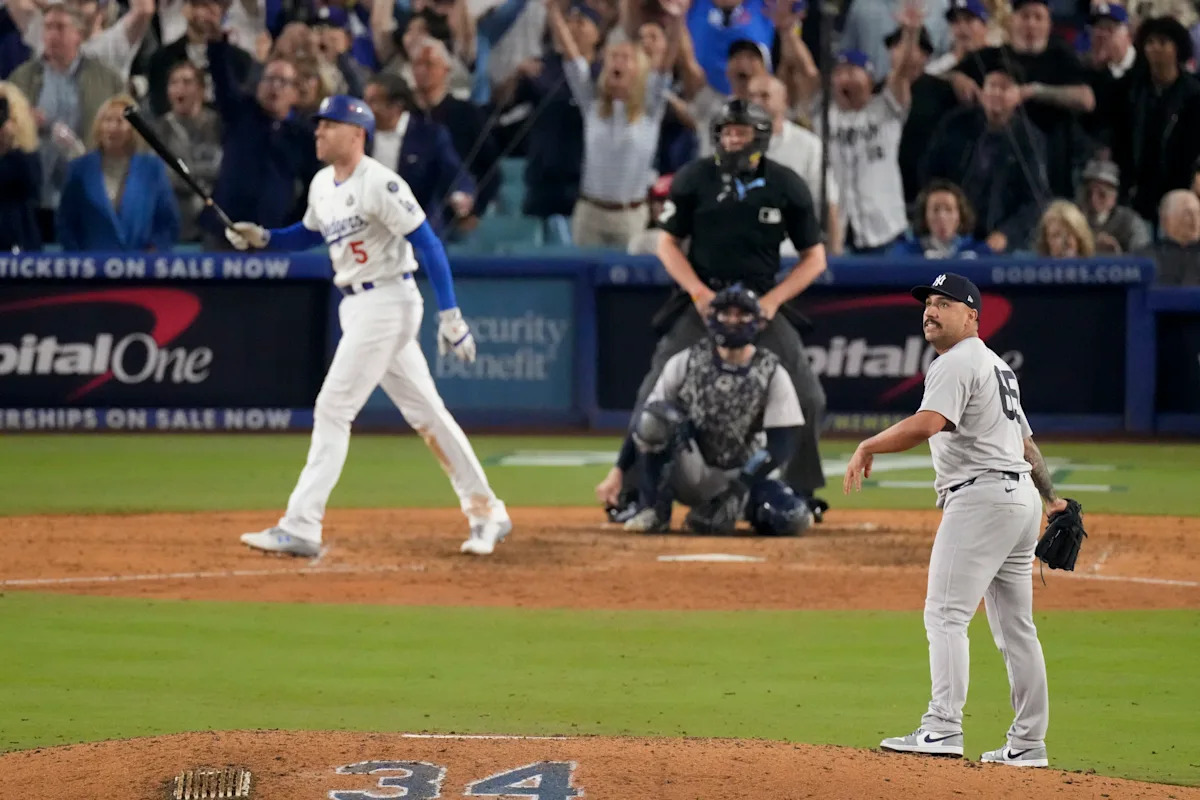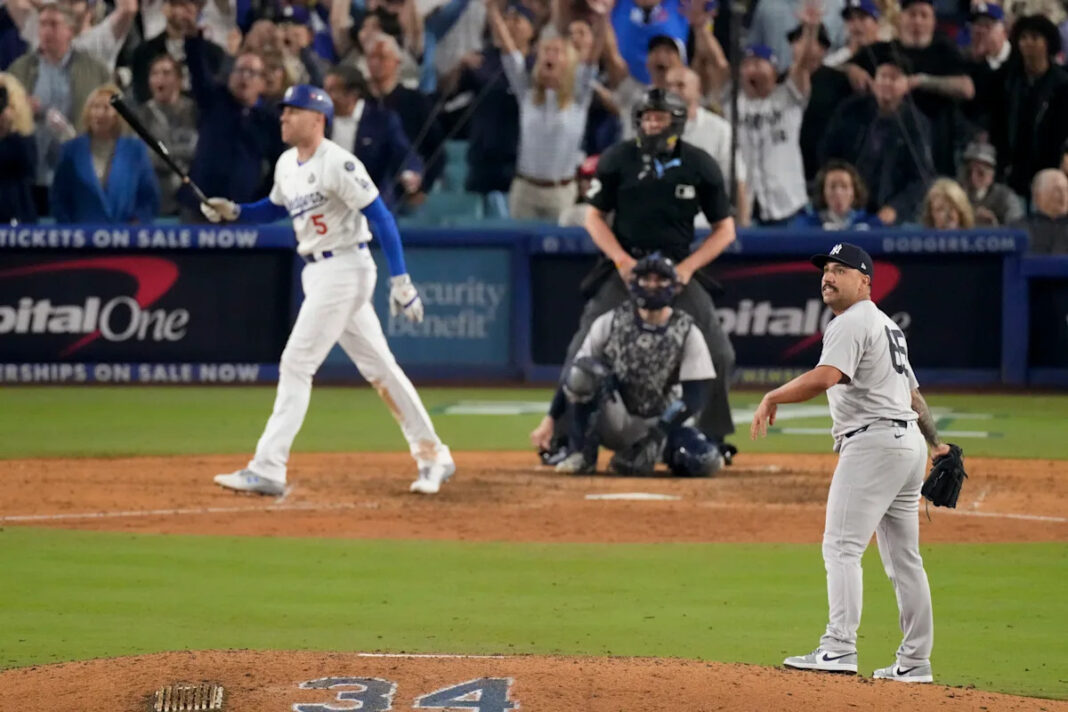“The agony of defeat still lingers in the Bronx as the New York Yankees’ quest for their 28th World Series title slipped through their fingers in the most heartbreaking of ways. With the weight of history on their shoulders, the Bombers came agonizingly close to clinching the championship, only to watch their dreams disintegrate in the most crushing of fashions. The scene was set, the crowd was electric, and the moment was ripe for the taking – but instead, the usually reliable Yankees bullpen, led by the unorthodox Nestor Cortes Jr., faltered when it mattered most, leaving fans and pundits alike wondering: what was Aaron Boone thinking?

Boone’s Strategy in High-Pressure Situations

In Game 4 of the World Series, Aaron Boone’s bullpen management in the 10th inning came under scrutiny. With the Yankees leading by one run, Boone opted to bring in Jake Cousins to face the bottom-third of the Dodgers’ lineup. While Cousins had been effective in high-leverage situations, including a brilliant performance in ALCS Game 5, his wildness resurfaced at a crucial moment, walking Gavin Lux and paving the way for Shohei Ohtani’s plate appearance.
The decision to go with Cousins was puzzling, considering the Yankees had other options available. Clay Holmes, Tommy Kahnle, and Luke Weaver had already pitched in regulation, but Boone could have turned to Tim Hill, a journeyman lefty who has consistently flummoxed opposing batters with his unique arm angle. Hill had performed well in seven appearances this October, making him a more reliable choice than Cousins.
Analysis of Boone’s Decision-Making Under Pressure
Boone’s decision to go with Nestor Cortes Jr. to face Ohtani was another questionable move. Cortes, a former All-Star, had not pitched since September 18 due to an elbow flexor strain, but had been rehabbing and was added to the World Series roster. While Boone cited the matchup as the reason for choosing Cortes, it’s unclear why he would trust a pitcher who had not seen game action in over a month to face one of the most dominant hitters in the game.
Boone’s decision-making under pressure has been a topic of discussion throughout the postseason. In high-stakes situations, managers are often forced to make quick decisions, and Boone’s choices have not always panned out. The Yankees’ bullpen has been a strength all season, but Boone’s management of it has been inconsistent, leading to costly mistakes.
Implications of Boone’s Decisions
The consequences of Boone’s decisions in Game 4 were severe. By failing to retire the side in order, the Yankees allowed the Dodgers to tie the game and ultimately take the lead. The loss put the Yankees in a precarious position, down 3-1 in the series.
The potential consequences of Boone’s decisions extend beyond Game 4. If the Yankees are unable to come back from this deficit, Boone’s managerial decisions will be scrutinized, and his job security may be called into question. The Yankees’ season, which had been filled with promise, could end in disappointment.
Lessons Learned from the Game’s Events
The events of Game 4 serve as a reminder that even the most well-planned strategies can go awry. Boone’s decisions highlighted the importance of having a reliable bullpen and a clear plan for high-pressure situations. The game also underscored the need for managers to be adaptable and willing to adjust their strategy mid-game.
The Yankees’ struggles in the World Series serve as a cautionary tale for teams preparing for the postseason. A deep bullpen and a sound managerial strategy are essential for success in the playoffs. The Yankees’ failure to address these areas has cost them dearly.
World Series Implications and Next Steps
Yankees’ Road Back to the Series
The Yankees’ chances of coming back from a 3-1 deficit are slim, but not impossible. The team’s strengths, including its potent offense and deep bullpen, will be crucial in the next three games. The Yankees must capitalize on their opportunities and find ways to contain the Dodgers’ powerful lineup.
The potential matchups and strategies for the next games will be crucial. The Yankees will need to find ways to get Gerrit Cole and Luis Gil back on track, and the bullpen must be more reliable. The team’s ability to adapt and adjust to the Dodgers’ lineup will be key.
Dodgers’ Dominance and the Road Ahead
The Dodgers’ performance in the World Series has been impressive, with the team’s offense and pitching staff clicking on all cylinders. The Dodgers’ strengths, including their deep lineup and dominant starting pitching, have given the Yankees fits.
The Dodgers’ road ahead is clear: they need to win one more game to secure their championship. The team’s confidence is high, and their momentum is building. The Dodgers’ ability to close out the series will depend on their continued strong performance.
Takeaways from Game 4 and the Series So Far
The key events of Game 4, including Anthony Volpe’s go-ahead grand slam, will be remembered for years to come. The game was a microcosm of the series, with the Yankees’ struggles and the Dodgers’ dominance on full display.
The series’ overall trends and storylines have been clear: the Dodgers’ offense has been unstoppable, and the Yankees’ pitching staff has been inconsistent. The implications of the series extend beyond the teams involved, with the outcome set to shape the narrative of the MLB season.
Conclusion
In conclusion, the Yankees’ heartbreaking loss in the 2024 World Series will be etched in the memories of fans for years to come, with Nestor Cortes Jr. and the bullpen’s inability to secure the final three outs serving as a painful reminder of what could have been. As we dissect the decision-making process of Aaron Boone, it becomes clear that the manager’s trust in Cortes, despite his impressive regular season form, was misplaced in the high-pressure environment of the World Series. The article has delved into the statistical analysis, highlighting Cortes’ struggles in similar situations and the availability of other, more suitable options in the bullpen.
The implications of this loss extend far beyond the confines of the 2024 season. It raises questions about the Yankees’ overall postseason strategy, the role of analytics in decision-making, and the mental preparation of players for the most critical moments of the game. As the team reflects on this disappointing outcome, they must also consider the long-term effects on their roster construction, coaching staff, and fan morale. The 2024 World Series will serve as a valuable learning experience, but only if the Yankees are willing to confront their mistakes and adapt to the ever-changing landscape of Major League Baseball.
As the Yankees look to regroup and rebound in the years to come, they would do well to remember that the margin between glory and defeat is often razor-thin. One pitching change, one managerial decision, or one clutch performance can alter the course of history. In the end, it is not the failure that defines a team, but how they respond to it. The Yankees have a choice to make: they can let the agony of the 2024 World Series linger, or they can channel it into a renewed sense of purpose, determination, and ultimately, championship glory. The world will be watching, and only time will tell which path they will choose.
